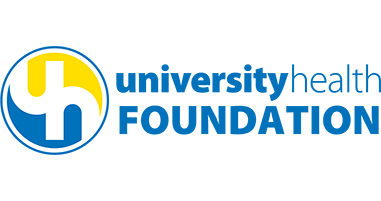
Our Essential Health System
Kansas City Needs University Health
University Health is the cornerstone of health care for our community, with a legacy of delivering vital services and life-saving care since 1870. More than a hospital, UH is a non-profit, tax-exempt medical provider that serves as the public health system for residents of Jackson County and Kansas City, Missouri.
With two state-of-the-art hospital campuses and more than two dozen community clinics and facilities, UH’s comprehensive and integrated health system offers best-in-class academic medical care to all who need it. Along with operating Kansas City, Missouri’s busiest Level One Trauma Center, University Health is a recognized regional leader in high-risk pregnancies and Level III neonatal intensive care.
Now More Than Ever
Now, more than ever, our mission of providing care to the medically underserved and financially stressed remains vital to the health of our community. We serve all who come seeking care, regardless of ability to pay. While this mission drives our benefit to the community, so too does UH’s commitment to leading-edge academic medicine. To that end, University Health is the primary teaching site for the University of Missouri–Kansas City Schools of Medicine, Nursing, Dentistry and Pharmacy. UH employs a s taff of 3,800, attracts some of the region’s (and nation’s) top doctors, and trains 200-300 residents each year.
Bridging the Gap
University Health is the largest and most comprehensive health safety-net provider serving Jackson County and Kansas City, Missouri. The need is staggering: nearly 13% of our community’s residents are uninsured. And while every hospital offers some uncompensated care, only University Health exists to bridge this gap. In fact, University Health will provide nearly $150,000,000 in at-cost uncompensated care this year. Nearly 66% of our 121,000 unduplicated patients – families and children – are on Medicare or Medicaid or have no insurance at all (22%, compared to the 3% average at other Missouri hospitals). Who are the uninsured? Most are employed. Others are students, between jobs, or disabled. Still others are retired. What they have in common is their need for medical care and their inability to pay for it.
For a Healthier KC
Building a healthy community is a responsibility we take very seriously. We believe passionately that everyone – whether insured or uninsured, prosperous or impoverished, privileged or disadvantaged – deserves access to essential, lifesaving medical care. By successfully shouldering the bulk of Jackson County’s uninsured care, we ensure that health care in the city — from both public and private sectors — remains stable and economically viable.
A National Leader in Health Equity
University Health (UH) is an academic medical center providing quality healthcare to the region. With two hospitals and clinics (primary and multiple specialties), behavioral health, dental health, and long-term care, we deliver compassionate care to 117,000+ patients annually. University Health Truman Medical Centers (UHTMC), the system’s main downtown location, was dedicated four decades ago, but its history dates back more than a century. Its forerunner was General Hospital, Kansas City’s first hospital, built in 1870. The roots of University Health Lakewood Medical Center (UHTMC) in Eastern Jackson County go back even further—to the mid-1800s when Jackson County purchased a large farm to care for those who could no longer care for themselves. With a rich past, we understand our responsibility to the future of medicine. As the primary teaching site for the University of Missouri-Kansas City’s (UMKC’s) Schools of Medicine, Dentistry, Nursing, and Pharmacy, we are passionate about teaching the next generation of healthcare professionals.
UH’s health equity approach aims to reduce disparities by providing care that is culturally competent, trauma-informed, and accessible to all. We are committed to providing health care for people with limited or no access due to their financial circumstances, insurance status, or health condition. UH provided $73 million in uncompensated care last year alone. Seventy percent (70%) of the patients we serve are uninsured or enrolled in Medicaid or Medicare. Our mission is to provide accessible state-of-the-art quality healthcare to our community regardless of the ability to pay. We are distinguished by our role in the community as:
…The only Community Mental Health Center (CMHC) linked with an academic hospital
…A designated Level 1 Adult Trauma Center
…The regional leader in high-risk pregnancies, delivering nearly half of Kansas City’s babies
Our priority is to ensure everyone has a fair and just opportunity to be healthier. As such, we offer services to enhance access to culturally competent healthcare and address the social determinants of health (SDOH) needs that our patients experience. UH’s on-site food pantry, fresh produce distribution in the community, health education, cultural health navigation, outreach services to unhoused individuals, and interpretative services and telephonic interpreting in 150+ languages are just a few of the ways we do so.
The Lown Institute Hospital Index for Social Responsibility’s (LIHSR) racial inclusivity index reflects how well a healthcare organization serves communities of color who reside in the areas surrounding a healthcare organization’s facilities. UH TMC is honored to be recognized as first in Missouri and eighth in the United States with LIHSR’s racial inclusivity index. Making this even more significant is the fact that Kansas City is, unfortunately, third in the LIHSR’s ranking of the most segregated healthcare cities in the United States.
